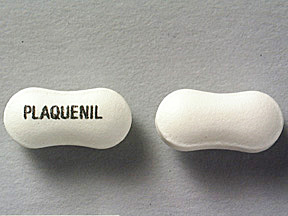Plaquenil: What You Need to Know
Contents:
Other than Plaquenil, what are the other antimalarial drugs?
Why are antimalarial drugs used to treat lupus?
How do antimalarial drugs work to control lupus symptoms?
What should I keep in mind when taking antimalarial drugs?
What are the possible side effects of antimalarial drugs?
Can I take other drugs when taking Plaquenil or other antimalarials?
Can I take antimalaria drugs during pregnancy?
What is Plaquenil?
 Plaquenil (hydroxychloroquine) is a medication most known for its original purpose of treating or preventing malaria, (a disease caused by parasites that enter the body through the bite of a mosquito). Today, Plaquenil and other antimalarials are also used to treat and help prevent symptoms caused by certain autoimmune diseases such as rheumatoid arthritis (RA), systemic lupus erythematosus, and discoid lupus, even though these diseases are not caused by malaria parasites. Plaquenil belongs in a class of medications known as disease-modifying antirheumatic drugs (DMARDs). It is most often prescribed to patients who try and fail biologic DMARDs (biologic DMARDs, also known as biologics, are medications made up of living matter such as human cells, bacteria and yeast), cannot tolerate biologics, or for those who fear trying the newer biologic DMARDs. This blog will focus on Plaquenil use in lupus and RA patients rather than its applications for malaria. Back to top
Plaquenil (hydroxychloroquine) is a medication most known for its original purpose of treating or preventing malaria, (a disease caused by parasites that enter the body through the bite of a mosquito). Today, Plaquenil and other antimalarials are also used to treat and help prevent symptoms caused by certain autoimmune diseases such as rheumatoid arthritis (RA), systemic lupus erythematosus, and discoid lupus, even though these diseases are not caused by malaria parasites. Plaquenil belongs in a class of medications known as disease-modifying antirheumatic drugs (DMARDs). It is most often prescribed to patients who try and fail biologic DMARDs (biologic DMARDs, also known as biologics, are medications made up of living matter such as human cells, bacteria and yeast), cannot tolerate biologics, or for those who fear trying the newer biologic DMARDs. This blog will focus on Plaquenil use in lupus and RA patients rather than its applications for malaria. Back to top
Other than Plaquenil, what are the other antimalarial drugs?
There are three main antimalarial drugs are prescribed for lupus symptoms. Here are the three most common antimalarial drugs prescribed for lupus:
- Hydroxychloroquine (Plaquenil): This is the most commonly prescribed antimalarial because it is generally believed to cause fewer side effects than the others. (Learn about side effects further down in this blog).
- Chloroquine (Aralen): This drug has been known to have more serious side effects, but it may be prescribed in situations where hydroxychloroquine cannot be used.
- Quinacrine (Atabrine): Quinacrine is another alternative, but it is prescribed less often because it can sometimes cause a yellow discoloration of the skin. It is sometimes given in addition to hydroxychloroquine if the Plaquenil on its own is not adequately managing symptoms. Only a compounding pharmacist can dispense Quinacrine as tablets are no longer manufactured. If needed and prescribed, your physician will direct you on how and where to get quinacrine.
Why are antimalarial drugs used to treat lupus?
 It is not clear why Hydroxychloroquine (or other antimalarial medications) are effective at treating autoimmune diseases, but these medications are usually prescribed when someone is first diagnosed with the disease. It is prescribed as a disease-modifier, in other words, to decrease pain and swelling, and prevent joint damage and disability.
It is not clear why Hydroxychloroquine (or other antimalarial medications) are effective at treating autoimmune diseases, but these medications are usually prescribed when someone is first diagnosed with the disease. It is prescribed as a disease-modifier, in other words, to decrease pain and swelling, and prevent joint damage and disability.
There is evidence that hydroxychloroquine may interfere with communication between cells in the immune system. This action suppresses the normally overactive immune response in lupus patients which may explain one reason Plaquenil works so well for those suffering with lupus.
Plaquenil is a slow-acting drug, meaning that it can take up to 6 months to experience the full benefits of this medication, but it is possible for symptoms to improve in as few as 1 or 2 months. Plaquenil and other antimalarials are the key to controlling lupus long-term, and some lupus patients may be on Plaquenil for the rest of their lives. For this reason, you can think of antimalarials as a sort of “lupus life insurance.” Studies have shown that lupus patients on antimalarials actually live longer than those who are not. Back to top
How do antimalarial drugs work to control lupus symptoms?
Here are some of the ways in which Plaquenil is used to control lupus symptoms:
- May prevent lupus flares by as much as 50%
- Reduce muscle and joint pain
- Reduce lupus related rashes
- Protect against pleuritis (inflammation of the lining of the lungs)
- Protect against pericarditis (inflammation of the lining of the heart)
- May prevent kidney damage
- May prevent lupus from affecting certain organs, central nervous system (your brain and spinal cord) and the kidneys
- Reduce fever and fatigue
- Restrains the immune system without increasing the odds for infections
- Protects against UV light
- Improves skin lesions that are not responsive to topical treatments (ointments and creams)
- Can lower cholesterol and blood glucose levels
- Those with antiphospholipid antibodies such as the lupus anticoagulant and anticardiolipin antibodies may have a decreased likelihood of blood clots
- Discoid lupus, subacute cutaneous lupus, including the mouth sores associated with lupus, are often effectively treated with antimalarial medications
- Effective in treating rheumatoid arthritis
- Effective in treating Sjogren’s syndrome, a common overlapping disease with lupus
It is important to note that while very helpful with some symptoms of lupus, antimalarials are not adequate treatment for more severe lupus symptoms such as kidney disease (kidney nephritis) and nervous system or blood vessel involvement (vasculitis). When lupus has affected these vital organs, immunosuppressive medications are usually prescribed to help minimize any irreversible injury. Back to top
What should I keep in mind when taking antimalarial drugs?
- Be sure to notify your other physicians that you are taking this drug. This drug does not have a strong effect on the immune system, so vaccines recommended by other physicians are generally acceptable.
- Be sure to notify your ophthalmologist that you are taking this medicine so you can have the correct visual screening tests. Every person starting Plaquenil should have a baseline ophthalmologic exam within the first year, (see the section below on How to use Plaquenil for things to ask for during your visit) and regular screenings thereafter.
- Tell your doctor if you have any of these conditions: psoriasis, porphyria, liver disease, alcoholism, or glucose-6-phosphate dehydrogenase (G-6-D) deficiency
- Do not smoke while taking antimalarial medications, since smoking actually reduces the benefits of these drugs. In fact, people with lupus should not smoke at all due to their increased risk of cardiovascular disease.
How to use Plaquenil
 Lupus and/or rheumatoid arthritis patients will most likely take this medication by mouth, usually once or twice daily or as directed. Hydroxychloroquine generally is given to adults in doses of 200 mg or 400 mg per day. In some cases, higher doses can be used. Your doctor may gradually increase or decrease your dosage over time to find the right levels for your specific symptoms and needs while having the least amount of negative side effects. Here are 10 things to keep in mind when using Plaquenil:
Lupus and/or rheumatoid arthritis patients will most likely take this medication by mouth, usually once or twice daily or as directed. Hydroxychloroquine generally is given to adults in doses of 200 mg or 400 mg per day. In some cases, higher doses can be used. Your doctor may gradually increase or decrease your dosage over time to find the right levels for your specific symptoms and needs while having the least amount of negative side effects. Here are 10 things to keep in mind when using Plaquenil:
- Take it on a regular schedule, meaning at the same time each day.
- Take Plaquenil EXACTLY as prescribed by your physician.
- Do not stop taking the medication without first speaking to your doctor.
- Taking Hydroxychloroquine with food and/or milk can help prevent stomach upset.
- If you miss a dose, take it as soon as you remember. If it is very near the time of the next dose, skip the missed dose and continue with your normal dosing schedule. Do not double dose at one time to catch up.
- Plaquenil should be stored away from light and moisture and at room temperature up to 86 degrees F (30 degrees C).
- Hydroxychloroquine is often used in combination with other drugs for more severe disease activity.
- This drug is commonly used to manage multiple complications of lupus and other connective tissue disorders.
- Hydroxychloroquine is a relatively safe medication but it is recommended to have regular monitoring by an ophthalmologist (eye doctor) while taking this drug.
- Before you begin taking Plaquenil, tell you doctor your complete medical history including any eye problems that may have come from other aminoquinolines (other antimalarial drugs) such as chloroquine.
Here is an excerpt from “28 Lupus Secrets” written by Dr. Donald Thomas, author of the Lupus Encyclopedia: All patients should be on an antimalarial. Preventing eye side effects from Plaquenil (American Academy of Ophthalmology): Recommended dosing for women
- ≥ 5’7” = 400 mg a day
- 5 ½” – 5’6 ½ “ = 300 mg a day
- Less than 5 ½” = 200 mg a day
- If you weigh < 135# and are not over weight (otherwise go by ht) = 300 mg a day
- If you weigh < 100# = 200 mg a day
Use an Amsler grid monthly to check your vision: See eye doctor yearly after 5 years on Plaquenil. Ask eye doctor to do:
- Visual Field 10-2 yearly
- SD-OCT or FAF or mfERG yearly
What are the possible side effects of antimalarial drugs?
Plaquenil is most often well-tolerated but, like with any drug, side effects are possible. Most people (about 90%) who take antimalarial medications experience no side effects. If common side effects do occur, they are usually minor and last only for a short period of time. Please note the rare side effects listed below, specifically retinopathy, which causes damage to the eyes. Side effects associated with Plaquenil are placed in three categories: common, less common, and rare. If you have any of the following effects and they persist or worsen, notify your doctor or pharmacist promptly. It is important to remember that your doctor has prescribed this medication because he or she has judged that the benefit to you is greater than the risk of side effects.
Common side effects:
- Nausea and diarrhea: This can often can be combatted by taking Plaquenil with food or milk. If you experience stomach upset while taking generic hydroxychloroquine, ask your doctor about trying name-brand Plaquenil instead. While these medications contain the same active ingredient, the preparation of generic hydroxychloroquine can sometimes cause stomach irritation that usually does not occur with the brand name Plaquenil. Your doctor can make sure that you receive this version of the medication by writing “do not substitute” on your prescription.
- Dizziness: Precautions with this side effect: Do not drive, use machinery, or do any activity that requires alertness until you are sure you can perform such activities safely. Avoid alcoholic beverages because they may increase your risk of liver problems while you are taking this drug.
- Cramps
- Headache
- Dry skin
- Loss of appetite
Less common side effects:
- Skin rashes or changes in skin color
- Thinning hair
- Weakness
- Irregular heartbeat
- Mental/mood changes
- Arm/leg/back pain
- Anxiety
- Depression
- Ringing in the ears or hearing loss
- Worsening of skin conditions: If you have psoriasis, Plaquenil may make your condition worse. Talk to your doctor if you have this condition.
Rare side effects:
 Vision changes/loss of vision: There is a chance that retinal damage will occur while taking hydroxychloroquine (Plaquenil) or chloroquine (Aralen). This is called known as hydroxychloroquine retinopathy. This sort of damage occurs only in 1 out of 5,000 people who take the drug for five years or more. You should see your ophthalmologist at least once per year so that she/he may check for retinal deposits. Retinal damage caused by hydroxychloroquine is generally reversible if caught early, but damage caused by chloroquine may not be. You can also monitor yourself between visits with a special grid called an Amsler grid, which can be obtained through your ophthalmologist.
Vision changes/loss of vision: There is a chance that retinal damage will occur while taking hydroxychloroquine (Plaquenil) or chloroquine (Aralen). This is called known as hydroxychloroquine retinopathy. This sort of damage occurs only in 1 out of 5,000 people who take the drug for five years or more. You should see your ophthalmologist at least once per year so that she/he may check for retinal deposits. Retinal damage caused by hydroxychloroquine is generally reversible if caught early, but damage caused by chloroquine may not be. You can also monitor yourself between visits with a special grid called an Amsler grid, which can be obtained through your ophthalmologist.- Seeing light flashes/streaks/halos/blacked out areas of vision
- Muscle weakness
- Severe abdominal pain
- Severe nausea/vomiting
- Seizures
- Shortness of breath
- Any signs of infection (persistent sore throat, fever)
- Yellowing of the eyes or skin
- Dark urine
- Symptoms of low blood sugar such as sudden sweating, shaking, rapid heartbeat, tingling in the hands/feet
Tell your doctor immediately if any of the above rare but very serious side effects occur. This is not a complete list of possible side effects. If you notice any other unusual effects not listed above, contact your doctor or pharmacist. Back to top
Can I take other drugs when taking Plaquenil or other antimalarials?
Yes, antimalarials can be taken with other lupus medications. This includes most all lupus medications: corticosteroids (e.g., prednisone), immunosuppressives, cytotoxic drugs, and NSAIDs. Antimalarial drugs are often given in combination with [prednisone]. This can reduce the steroid dosage needed to control lupus symptoms. This is desirable because corticosteroids such as prednisone are known to cause several undesirable side effects. The lower the dosage of steroids, the better for the patient. You may be given a steroid medication at first to help reduce the lupus symptoms until the time that the Plaquenil begins to take effect, which, as we mentioned, can take several months.
Some drugs that may interact with Plaquenil:
- antacids
- botulinum toxins
- digoxin
- kaolin
- magnesium trisilicate
- methotrexate
- metoprolol
- penicillamine
Can I take antimalarial drugs during pregnancy?
 Antimalarials are safe to take during pregnancy but please make sure to speak with your physician if you are pregnant or planning to become pregnant. There have been no known occurrences of fetal abnormalities from taking hydroxychlorquine, and physicians at several major universities have been using antimalarial drugs for years to treat women with lupus without any negative side effects.
Antimalarials are safe to take during pregnancy but please make sure to speak with your physician if you are pregnant or planning to become pregnant. There have been no known occurrences of fetal abnormalities from taking hydroxychlorquine, and physicians at several major universities have been using antimalarial drugs for years to treat women with lupus without any negative side effects.
Some medications you may be taking like methotrexate, cyclophosphamide, mycopenolate, mofetil, lefllunomide, and warfarin may be harmful and should not be taken while pregnant. Some drugs need to be stopped months before trying to become pregnant.
Be sure to speak with you physician well in advance if you intend to become pregnant. Hydroxychloroquine is one medication that could and should be continued if taken prior to pregnancy as it has been shown to contribute to better pregnancy outcomes for women with SLE. It is not known whether hydroxychloroquine passes into breast milk or if it could harm a nursing baby. Do not use Plaquenil without telling your doctor if you are breast-feeding. Our blog on Lupus and Pregnancy has much more valuable information on this topic. Back to top
We hope that this blog has been helpful in answering some of your questions about Plaquenil and other antimalarial drugs used to treat lupus. As always, we welcome your comments and input and love when you share our blogs with others who you think might find the content helpful!
Sources: http://www.drugs.com/plaquenil.html, http://www.webmd.com/drugs/2/drug-6986/plaquenil-oral/details, https://www.rheumatology.org/Practice/Clinical/Patients/Medications/Hydroxychloroquine, http://arthritis.about.com/od/plaquenil/a/plaquenil.htm, http://www.hopkinslupus.org/lupus-treatment/lupus-medications/antimalarial-drugs/, http://www.phrma.org/what-are-biologic-medicines, http://www.aao.org/publications/eyenet/201105/retina1.cfm
Author: Karrie Sundbom
All images unless otherwise noted are property of and were created by Kaleidoscope Fighting Lupus. To use one of these images, please contact us at [email protected] for written permission; image credit and link-back must be given to Kaleidoscope Fighting Lupus.
All resources provided by us are for informational purposes only and should be used as a guide or for supplemental information, not to replace the advice of a medical professional. The personal views expressed here do not necessarily encompass the views of the organization, but the information has been vetted as a relevant resource. We encourage you to be your strongest advocate and always contact your healthcare practitioner with any specific questions or concerns.

